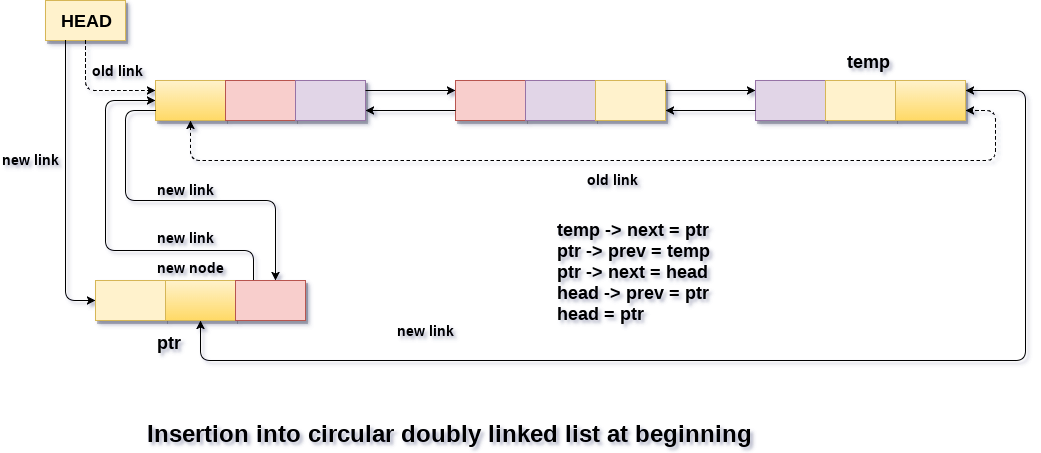TheDeveloperBlog.com
C-Sharp | Java | Python | Swift | GO | WPF | Ruby | Scala | F# | JavaScript | SQL | PHP | Angular | HTML
Insertion in Circular Doubly Linked List at Beginning
Insertion in Circular Doubly Linked List at Beginning with Introduction, Asymptotic Analysis, Array, Pointer, Structure, Singly Linked List, Doubly Linked List, Circular Linked List, Binary Search, Linear Search, Sorting, Bucket Sort, Comb Sort, Shell Sort, Heap Sort, Merge Sort, Selection Sort, Counting Sort, Stack, Qene, Circular Quene, Graph, Tree, B Tree, B+ Tree, Avl Tree etc.
Insertion in circular doubly linked list at beginningThere are two scenario of inserting a node in circular doubly linked list at beginning. Either the list is empty or it contains more than one element in the list. Allocate the memory space for the new node ptr by using the following statement. ptr = (struct node *)malloc(sizeof(struct node)); In the first case, the condition head == NULL becomes true therefore, the node will be added as the first node in the list. The next and the previous pointer of this newly added node will point to itself only. This can be done by using the following statement.
head = ptr;
ptr -> next = head;
ptr -> prev = head;
In the second scenario, the condition head == NULL becomes false. In this case, we need to make a few pointer adjustments at the end of the list. For this purpose, we need to reach the last node of the list through traversing the list. Traversing the list can be done by using the following statements.
temp = head;
while(temp -> next != head)
{
temp = temp -> next;
}
At the end of loop, the pointer temp would point to the last node of the list. Since the node which is to be inserted will be the first node of the list therefore, temp must contain the address of the new node ptr into its next part. All the pointer adjustments can be done by using the following statements. temp -> next = ptr; ptr -> prev = temp; head -> prev = ptr; ptr -> next = head; head = ptr; In this way, the new node is inserted into the list at the beginning. The algorithm and its C implementation is given as follows. Algorithm
Write OVERFLOW [END OF LOOP] 
C Function
#include<stdio.h>
#include<stdlib.h>
void beg_insert(int);
struct node
{
int data;
struct node *next;
struct node *prev;
};
struct node *head;
void main ()
{
int choice,item;
do
{
printf("\nEnter the item which you want to insert?\n");
scanf("%d",&item);
beg_insert(item);
printf("\nPress 0 to insert more ?\n");
scanf("%d",&choice);
}while(choice == 0);
}
void beg_insert(int item)
{
struct node *ptr = (struct node *)malloc(sizeof(struct node));
struct node *temp;
if(ptr == NULL)
{
printf("\nOVERFLOW");
}
else
{
ptr->data=item;
if(head==NULL)
{
head = ptr;
ptr -> next = head;
ptr -> prev = head;
}
else
{
temp = head;
while(temp -> next != head)
{
temp = temp -> next;
}
temp -> next = ptr;
ptr -> prev = temp;
head -> prev = ptr;
ptr -> next = head;
head = ptr;
}
printf("Node Inserted");
}
}
Output Enter the item which you want to insert? 12 Node Inserted Press 0 to insert more ? 0 Enter the item which you want to insert? 23 Node Inserted Press 0 to insert more ? 1
Next TopicDoubly Linked List
|
Related Links:
- Insertion in Doubly Linked List at Beginning
- Insertion in Doubly Linked List at The End
- Insertion in Doubly Linked List After Specified Node
- Insertion in Singly Linked List at Beginning
- Insertion in Binary Search Tree
- Insertion in AVL Tree
- Insertion in Circular Doubly Linked List at Beginning
- Insertion in Circular Doubly Linked List at End
- Insertion in Singly Linked List at End
- Insertion in Circular Singly Linked List at Beginning
- Insertion in Circular Singly Linked List at End
- Insertion Sort
- Insertion in Singly Linked List After Specified Node

